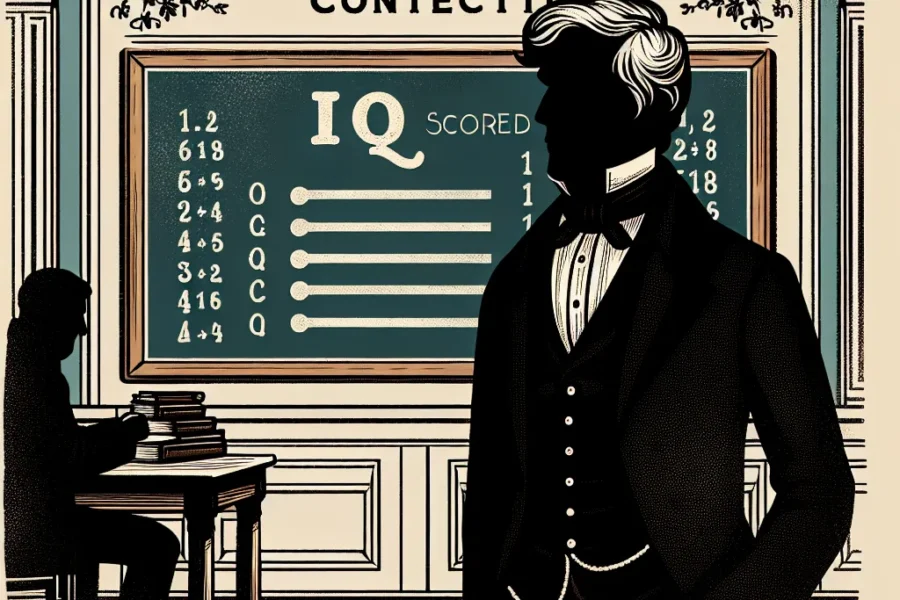John Quincy Adams was one of the most accomplished and intellectually gifted presidents in American history. Born in 1767, he was the eldest son of John Adams, the second President of the United States, and Abigail Adams, one of the most influential women of her time. Representing the unique intersection of political prowess and intellectual capability, John Quincy Adams carved a niche for himself in the annals of American history. One question that often arises is: What was John Quincy Adams’s IQ score?
If you are looking for legitimate IQ Tests which pass the entry bar for Mensa, see our IQ Tests.
While it’s impossible to ascertain an exact IQ score for John Quincy Adams since modern IQ tests did not exist during his lifetime, his intellectual achievements and prolific contributions provide a window into his remarkable cognitive abilities. This article seeks to piece together the impressive intellectual tapestry of John Quincy Adams by examining his educational background, professional triumphs, and significant contributions to politics and science.
Born into a family of immense political and intellectual repute, John Quincy Adams was practically destined for greatness. His education began at an early age, spurred on by both his father and mother, who valued intellectual rigor and discipline. At age ten, he embarked on a diplomatic mission to France with his father, which afforded him the opportunity to study in Europe. By the age of fourteen, Adams was proficient in several languages, including French, Dutch, and Greek, demonstrating his extraordinary intellectual capacity.
Adams later attended Harvard College, where he graduated with a Bachelor of Arts degree in 1787. Interestingly, while at Harvard, he studied under Joseph Willard, a noted educator and astronomer, who was the president of Harvard University at the time. It was at Harvard that Adams further honed his intellectual abilities, excelling in subjects like rhetoric and philosophy. However, his academic journey didn’t stop there—he continued to study law, and in 1790, he was admitted to the bar, marking the beginning of his legal and political career.
In addition to his academic and professional achievements, John Quincy Adams possessed a profound interest in scientific endeavors. He was particularly fascinated by astronomy and advocated for the establishment of a national observatory. His scientific pursuits were not merely hobbies but rather extensions of his intellectual curiosity and commitment to progress and knowledge.
John Quincy Adams’s diplomatic career began in earnest when President George Washington appointed him as the U.S. Minister to the Netherlands in 1794. This appointment demonstrated Washington’s confidence in Adams’s diplomatic acumen and intellectual rigor. Adams’s tenure in various diplomatic roles, including stints in Prussia, Russia, and the United Kingdom, further cemented his international reputation as a skilled diplomat and a man of prodigious intellect.
One of the cornerstones of Adams’s intellectual legacy is his role in shaping American foreign policy. As Secretary of State under President James Monroe, Adams was instrumental in the formulation of the Monroe Doctrine, a significant policy declaration that opposed European colonialism in the Americas. This doctrine not only showcased Adams’s deep understanding of international relations but also his visionary approach to American sovereignty and geopolitical strategy.
Apart from his diplomatic and political work, Adams was a voracious reader and prolific writer. He maintained a detailed diary throughout his life, spanning over 14,000 pages. This diary is an invaluable resource for historians and provides insights into his thoughts, observations, and intellectual activities. It is a testament to his disciplined mind and remarkable memory.
As the sixth President of the United States, Adams faced numerous challenges but remained committed to his vision of improving American society through education and infrastructure development. He proposed a comprehensive program that included the establishment of a national university, the creation of a naval academy, and the construction of roads and canals. Though his ambitious plans were met with resistance and were largely unrealized during his presidency, they reflected his forward-thinking approach and his belief in the importance of national development.
Adams’s post-presidential career was equally distinguished. He served as a member of the House of Representatives for 17 years, earning the nickname “Old Man Eloquent” for his powerful and articulate speeches. One of his most notable contributions during this period was his staunch opposition to slavery. Adams believed that slavery was morally wrong and fought tirelessly against it, often clashing with pro-slavery congressmen. His passionate advocacy for abolition, despite significant opposition, underscored his moral integrity and intellectual conviction.
In evaluating John Quincy Adams’s intellectual legacy, it is essential to consider the context of his time. The 18th and 19th centuries were marked by significant intellectual and scientific advancements. Amidst this backdrop, Adams’s contributions to politics, science, and education were not only influential but also indicative of a highly capable and intelligent individual. While we may never know his exact IQ score, it is evident that Adams possessed an extraordinary intellect that was reflected in his diverse accomplishments.
Contemporary measures of intelligence, such as IQ tests, quantify an individual’s cognitive abilities in relation to a standardized scale. However, intelligence is multi-faceted and cannot be fully encapsulated by a single number. John Quincy Adams’s legacy serves as a reminder that intellectual greatness transcends numerical scores. His life was characterized by continuous learning, critical thinking, and an unwavering commitment to higher ideals.
Moreover, Adams’s broad range of interests and achievements underscores the importance of a well-rounded intellect. His proficiency in languages, his diplomatic successes, his visionary policies, and his advocacy for education and science collectively paint the picture of an intellectually gifted individual whose contributions have left an indelible mark on American history.
In today’s world, where the emphasis on STEM (science, technology, engineering, and mathematics) education is paramount, Adams’s life serves as an inspiration. It highlights the significance of fostering intellectual curiosity and embracing a holistic approach to learning. Adams’s legacy encourages us to pursue knowledge across various fields, to remain committed to continuous improvement, and to strive for excellence in all endeavors.
John Quincy Adams was undoubtedly a man of remarkable intellect. His life and career were distinguished by numerous academic, diplomatic, and political achievements that testify to his exceptional cognitive abilities. While we may never know his precise IQ score, his contributions to American society and his enduring legacy are a testament to his intellectual prowess. By studying his life, we gain valuable insights into the nature of true intellectual greatness and are reminded of the importance of education, critical thinking, and the relentless pursuit of knowledge.



Leave a Comment